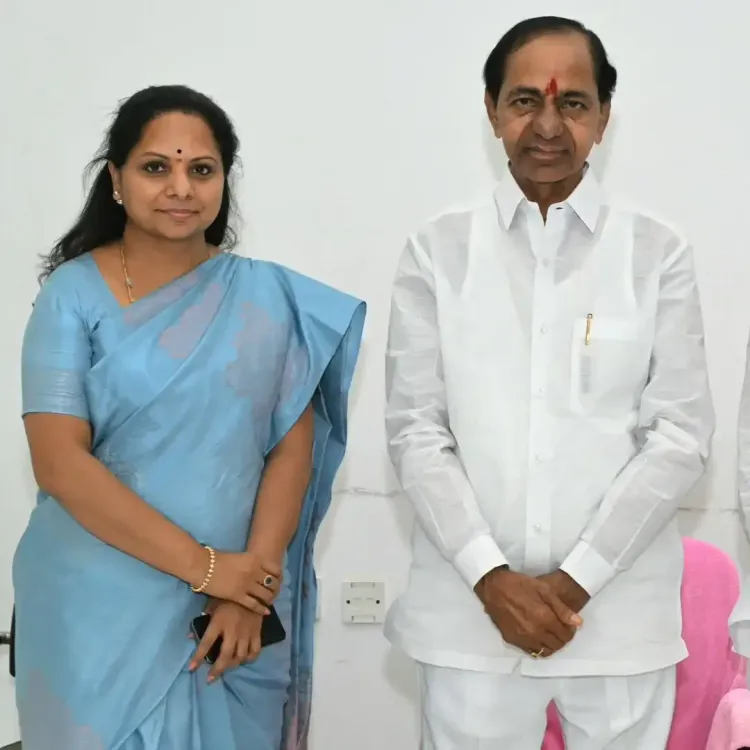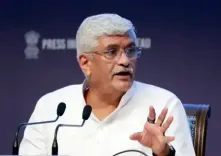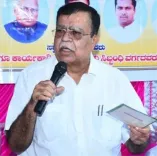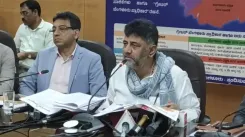What led to Kavitha’s suspension from BRS?

Synopsis
Key Takeaways
- Kavitha's suspension underscores internal family conflicts.
- The leaked letter revealed significant political tensions.
- Accusations against family members highlight division in the party.
- Kavitha's political trajectory faces challenges after her arrest.
- The situation raises questions about BRS's future stability.
Hyderabad, Sep 2 (NationPress) The most significant turmoil for Kalvakuntla Chandrasekhar Rao, commonly known as KCR, stems from an unforeseen source—his daughter Kalvakuntla Kavitha. A sequence of incidents triggered by the public disclosure of an internal letter Kavitha penned to KCR three months ago led to her suspension from the Bharat Rashtra Samithi (BRS) on Tuesday.
Kavitha, the first and only female politician in the KCR lineage, faced suspension due to allegations of anti-party activities. The BRS released a statement confirming the decision made by KCR, who also serves as the party president.
In recent weeks, Kavitha has accused individuals close to KCR of orchestrating conspiracies against her, culminating in her recent attack on her cousin and former minister T. Harish Rao. This outburst occurred shortly after Chief Minister A. Revanth Reddy declared in the Assembly that the Central Bureau of Investigation (CBI) would investigate alleged irregularities concerning the Kaleshwaram irrigation project established during the BRS administration.
During a press conference, she pointed fingers at Harish Rao, her cousin, former MP J. Santosh Kumar, and another former MP, Megha Krishna Reddy, blaming them for KCR being 'framed' in the P. C. Ghose Commission investigation related to the Kaleshwaram project. Kavitha accused them of damaging KCR's reputation and even claimed that Harish Rao's dismissal as Irrigation Minister during BRS's second term was linked to his alleged involvement in the Kaleshwaram irregularities.
Her explosive remarks, even while defending her father, were perceived as a 'confession' since KCR and Harish Rao had approached the High Court to dismiss the Ghose Commission report that implicated them.
Kavitha's suspension reflects a prolonged power struggle within the KCR family, which began to unfold publicly in May when she reacted vehemently to the alleged leak of her letter to KCR, which underscored internal party issues. She asserted that those surrounding KCR were responsible for the leak, famously stating, 'KCR is a god surrounded by devils.'
Initially targeting her cousin, former Rajya Sabha member J. Santosh Kumar, she later accused a faction of party leaders of contributing to her defeat in the 2019 Lok Sabha elections and insinuated that efforts were underway to transfer the BRS to the BJP.
Kavitha disclosed that the idea of merging the BRS with the BJP was proposed while she was imprisoned concerning the Delhi liquor policy case and that she vehemently opposed this suggestion.
She has dismissed rumors of starting a separate party, affirming her commitment to the BRS and KCR's leadership. Kavitha alleged that there are attempts to alienate her from her family and the party.
Last month, she lashed out at senior leader and former minister G. Jagadish Reddy, a known KCR loyalist, responding to his comments by calling him 'Lilliput.'
Her statement that KCR is her only leader was interpreted as an indirect jab at her brother and BRS Working President K.T. Rama Rao (KTR), who is perceived by many as KCR's successor.
KTR, KCR's only son, held various crucial cabinet positions during the BRS's governance from 2014 to 2023.
Reports of tension between KTR and Harish Rao have circulated, with Harish Rao, KCR's nephew, being a part of TRS (now BRS) since KCR founded the party in 2001 to advocate for Telangana's statehood.
Harish Rao, who managed key portfolios, including Irrigation, Finance, and Health during BRS's two terms, was believed to be dissatisfied with KTR's portrayal as KCR's political heir. However, he recently stated his willingness to work under KTR if KCR appoints him as BRS President, quelling speculations.
While many anticipated that the perceived discord between KTR and Harish Rao could instigate turmoil within the party, it was the party's leading female figure who initiated the rebellion.
Kavitha, who completed her B Tech in 1999, joined the Telangana statehood movement in 2008 upon returning from the US after her marriage to D. Anil Kumar. She established Telangana Jagruthi to provide cultural impetus to the Telangana struggle.
She gained popularity among BRS supporters, particularly women, for organizing and leading annual Bathukamma celebrations.
In 2014, she won a seat in the Lok Sabha from the Nizamabad constituency, emerging as a vital party leader. However, she faced a surprising defeat in 2019 against the BJP's Arvind Dharampuri.
In 2020, she was elected to the Legislative Council after winning a by-election from the Nizamabad Local Authorities Constituency. Although she was considered a strong candidate for a Cabinet position, KCR chose not to include her, seemingly to prevent the emergence of competing power centers within the family.
BRS's devastating defeat in the November 2023 Assembly elections shocked KCR, who had governed Telangana since its statehood in 2014.
Her arrest in March 2024 by the Enforcement Directorate in connection with a money laundering case tied to the Delhi liquor scam represented a significant blow to KCR and the party.
Allegations suggested her involvement in a 'South Group' that conspired with senior leaders of the Aam Aadmi Party (AAP) to secure benefits in the creation and application of the excise policy.
BRS faced a humiliating defeat in the Lok Sabha elections, failing to secure any seats for the first time since its inception.
Kavitha spent five months in jail until the Supreme Court granted her bail in August last year. After a brief period of silence, she re-emerged, despite reports indicating that KCR preferred she remain uninvolved in party activities.
Following a significant public meeting organized by BRS in Warangal on April 27 to celebrate its silver jubilee, where KCR vowed a political comeback, Kavitha's leaked letter to KCR unleashed a storm. She criticized KCR's speech, questioning his 'soft approach' towards the BJP and his silence on pivotal matters.
The leak initiated a series of events that ultimately led to her suspension from the party.





